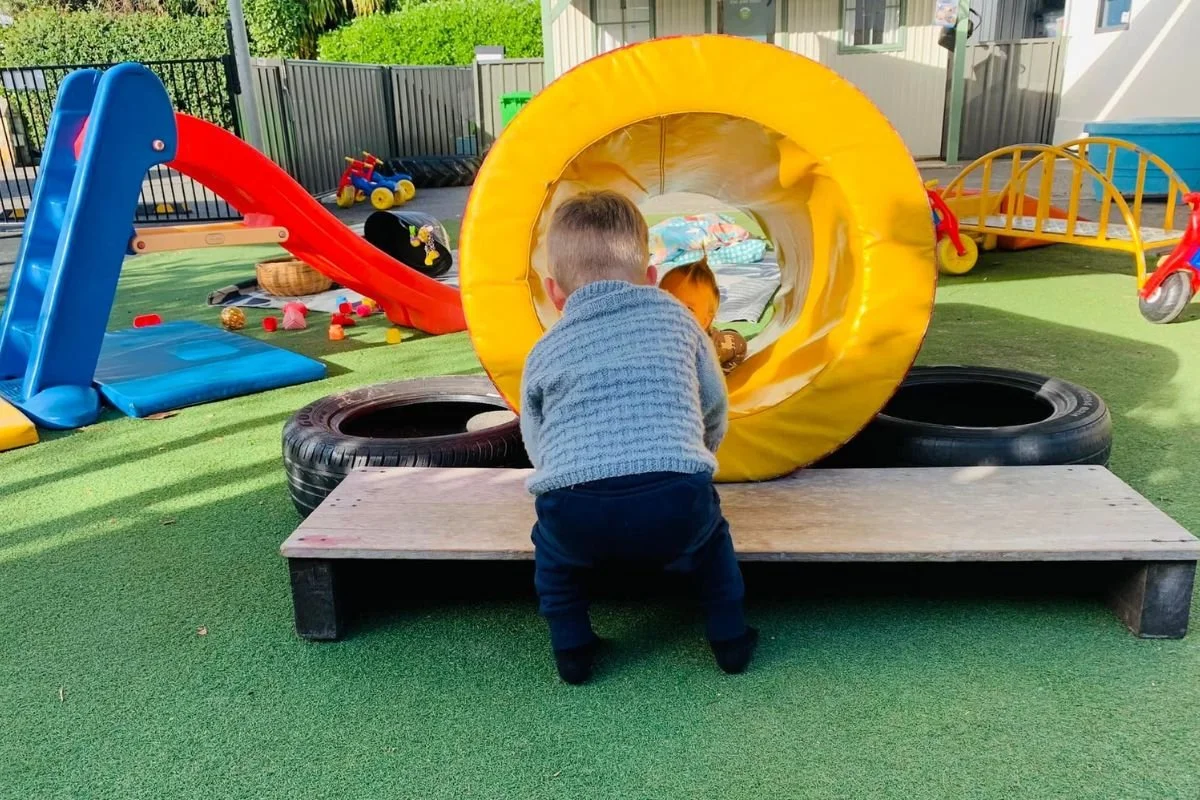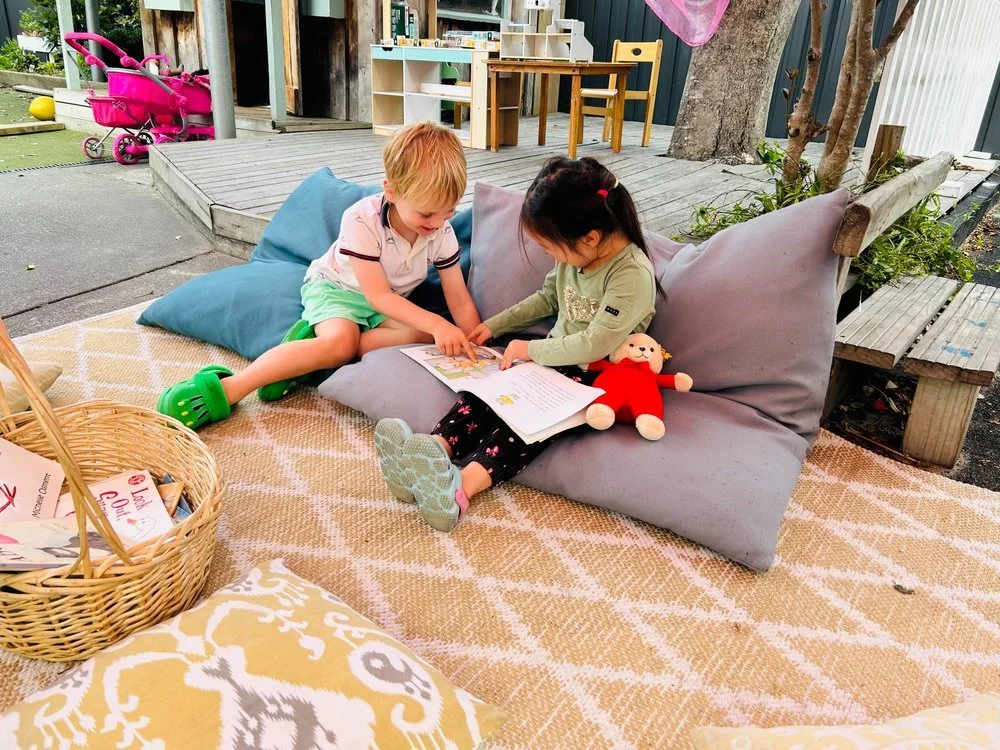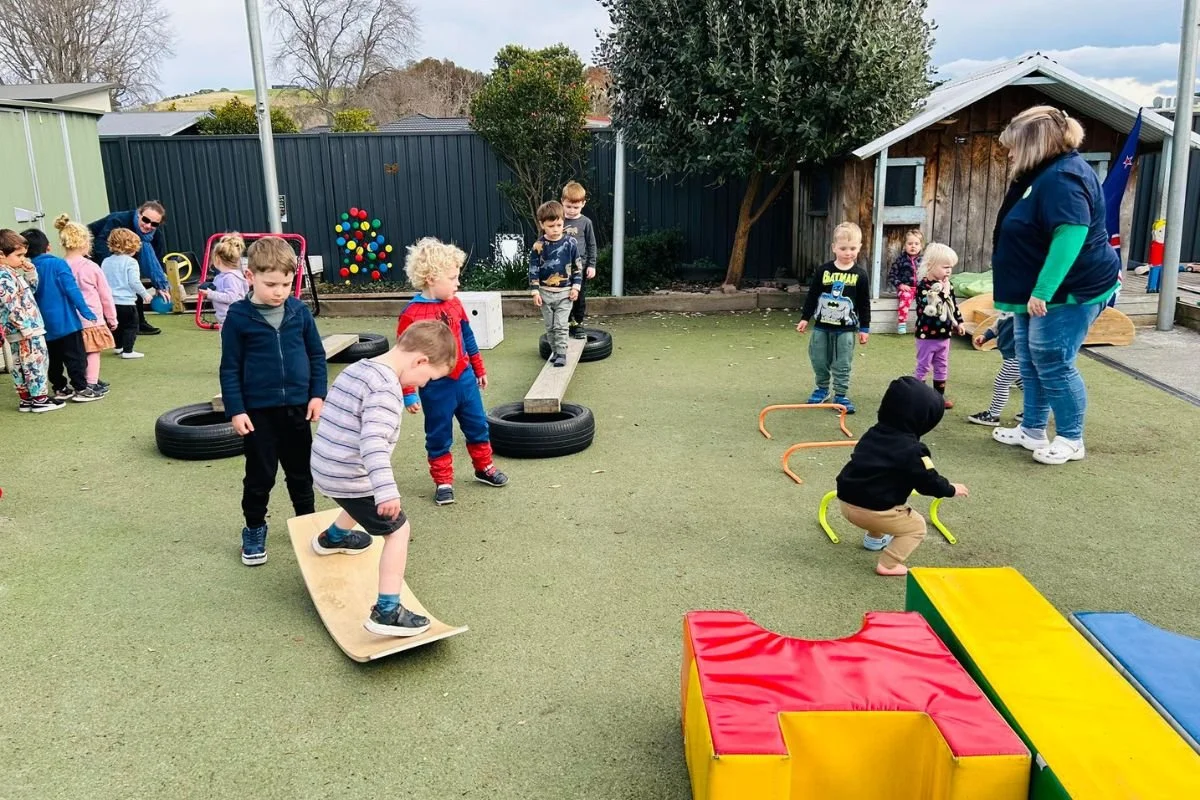Whānau Information
Whānau Information
At Happy Days, whānau are at the heart of everything we do.
We value open communication, respectful relationships, and working alongside whānau to support each child’s learning journey.
This page is here to guide you ,from answering common questions to walking you through enrolment, and helping you understand what daily life at Happy Days looks and feels like.
FAQ’s
-
When your child starts at Happy Days, you can expect a gradual settling-in process, where your child will be introduced to the new environment through visits and gradually longer stays. The teachers will want to learn about your child's routines, preferences, and needs. We will offer various forms of communication to keep you informed and involved.
Here's a more detailed look at what to expect:
1. Settling In: gradual Introduction
We will work with you to develop a plan for your child's introduction, involving settling visits before your official start date, with progressively longer stays.
Information Sharing:
Our Head Teacher and team will want to know about your child's routines (sleep, feeding, toileting), preferences (how they like to be comforted, their interests), allergies, and any other relevant information.
Communication:
Regular communication will be established to discuss your child's progress, interests, and any concerns, with opportunities to involve you in decisions.
Throughout the process you will be supported by Centre Manager Meagan, Head Teachers Vanessa and Michelle, and all the team of teachers.
-
Our centres provide child-led and interest based learning. The programme is based on observing children regularly, evaluating their needs and planning learning experiences based on the information obtained from these observations. We plan programmes to meet the children’s learning needs and therefore enhance their development. Each child will be guided to develop at their own pace according to his or her unique, individual way. Programmes are evaluated regularly and are planned using the guiding principles of Te Whāriki, the Early Childhood curriculum of the Ministry of Education.
Our practices reflect the bi-cultural heritage of Aotearoa/New Zealand. We recognise that Early Childhood education facilitates the development of confidence, independence, and learning for our children. Indoor and outdoor experiences are an integral part of our programme and routine. Play is central to children’s development by providing opportunities for both structured and spontaneous learning experiences. Play is a child’s unique way to learn about their world. It is also a means of re visiting prior learning. Routines give children a sense of the passage of time as they move through their day. Routines encourage independence and an understanding of personal hygiene.
We provide an atmosphere that is warm, accepting and welcoming to both children and their families. Our emphasis on maintaining a home like environment supports children in their transition from home to centre.
Happy Days team supports quality care and education through excellent kaiako/child ratios. Care moments are valued as key moments in our day and are vital learning opportunities. These times are unhurried, nurturing and responsive to each child’s emotional and developmental needs.
Relationships are at the heart of our Hauroa focus
Our team place special emphasis on connectivity with all those involved in our community. Strong foundations are laid with a focus on collaborative whakawhānaungatanga/relationships (one of our priorities) with tamariki, whānau, our team and wider community. We recognise positive relationships for tamariki in the first few years of life form a template for future relationships.
The mana of each child is held paramount, and our curriculum focuses on respectful, responsive and reciprocal relationships as a foundation for wellbeing, learning and development – hauora (one of our priorities). Our passionate and professional kaiako/teachers intentionally plan, set up learning spaces and experiences according to individual interests and needs. Assessment of learning and continuity progression of learning is a collaborative approach between the child, kaiako and whānau. We recognise tamariki as active and creative learners, thinkers and investigators. Learning experiences offer plenty of opportunities for tamariki to freely explore at their own time and pace, where they develop skills needed to enquire and extend on their funds of knowledge. We embrace and celebrate each child’s unique language, culture and identity, supporting each child’s strong sense of belonging at Happy Days.
Kaiako connections with each other are at the heart of well-being and quality connections. Kaiako have mutual respect, appreciation of each other’s strengths, sensitive to each other’s feelings and offer support to one another. These relationships create a safe environment for reflective conversations where kaiako continue to learn alongside each other. This connectivity between kaiako has a positive impact for our Tamariki. Whereby it offers consistency and reliability through role modelling positive relationships.
-
We operate an open-door policy, where parents and family are welcome into the Centre at any time. We believe that it is important to develop strong partnerships between the Centre and children’s parents/whānau. Parent participation sends strong positive messages to your child that you support them and are involved in their Centre environment.
Communication is a vital ingredient to the success of this partnership and we welcome and encourage you to share your aspirations for your child, contributing to our knowledge of your child and family to further support planning and assessment.Communication with whānau at Happy Days fosters strong partnerships and supports children's learning and wellbeing. We encourage open, two-way communication and engaging in meaningful ways.
Communication methods we use include in-person conversations, phone calls, text messages and via our online platform, Xplor.
We value regular conversations with whānau - during drop-offs to find out how your child's night and morning has been. At pick-up times, we share how your child's day was and what they have enjoyed doing.
Regular Updates:
We provide consistent updates on children's learning, progress, and wellbeing, in-person each day, through our online platform Xplor and monthly learning stories added to your child's individual Profile Book.
-
At Happy Days, whānau involvement is valued so we can create a supportive and culturally responsive learning environment. We encourage whānau to share their knowledge and perspectives with us and to be actively engaged in their child's learning journey.
We value and encourage whānau involvement because we see it at important to:
Support Children's Wellbeing:
It provides children with a sense of security, belonging, and emotional support, which is vital for their development.
Enhance Learning:
When parents and whānau are actively involved, children are more likely to achieve and develop a positive self-esteem.
Foster Continuity:
Partnerships between home and Happy Days helps ensure that learning experiences are consistent and supportive.
Celebrate Cultural Identity:
Encourages celebrations and affirmation of children's cultural identity, language, and traditions, as well as the recognition of diverse cultural backgrounds.
Shared Responsibility:
Both whānau and teachers have a role to play in supporting children's learning and collaborate to develop shared goals and strategies.
-
Happy Days is a unique early childcare centre with a “home away from home” feel. The moment you step into our centre, you will be warmly welcomed and get a sense of whānau connection. We are a small, intimate centre with a licence for 32 tamariki/children, offering quality care and education for tamariki aged 0-6 years old. Our two beautiful age-appropriate environments provide a place where tamariki know, play, love and learn (our philosophy pou/pillars).
Happy Days is situated in Taradale and is the closest early childhood centre to the heart of Taradale. Our beautiful maunga – Pukekura (Sugar Loaf) is the most prominent landmark in Taradale which overlooks our centre and all of Taradale.
Our centre has a strong connection with our local community through regular excursions to our local landmarks – our library, our local park and the Taradale shopping hub. We are fortunate to be so central to these wonderful community spots and recognise this as a wonderful way to connect our centre and tamariki with the wider community. Taradale is the largest suburb of Napier which means these local spots are vibrant with people. Our tamariki delight in saying hello to everyone they see.
Hauora ~ a community approach to each child’s holistic health and wellbeing
At Happy Days, we view our tamariki wellbeing with a holistic lense, where both mental and physical health are considered. Meeting the developmental needs of tamariki is about building a strong foundation for physical, mental and spiritual health. Kaiako role model positive attitudes towards hauora by encouraging healthy eating, setting up daily physical learning experiences, mindfulness practices are weaved into interactions and an absolute priority that each child has an embedded sense of belonging at Happy Days.
Kaitiakitanga ~ guardians of our environment
Happy Days recognises the strong connection between spirituality, people, and the natural world. Kaiako have a keen sense of responsibility for our environment and weave kaitiakitanga into daily rituals, tikanga and teaching practices. You will hear this in conversation between tamariki and kaiako, as well as seeing this in our well-loved garden and nature spaces.
Nga Pepi Room ~ 0-2-year-olds has a roll of up to 10 tamariki with kaiako Michelle, Ellie, Celia, Odette along with student teacher, Jesmika.
Puawai Room ~ 2-6-year-olds has a roll of approximately 22 tamariki with kaiako Vanessa, Loretta, Nisha, Kate, and Ange, along with student teacher, Jess.
-
Please contact the Centre Manager to arrange a visit with or without your child to see the facilities and get a feel for the environment.
To enrol your child at Happy Days, we will provide you with an Enrolment Form.
You will need to provide the following documentation:
- Proof of identity (this could be a birth certificate, passport, or residency document.)
- Immunisation record: This is important for ensuring your child is up-to-date on vaccinations (if you have immunised your child).
- Medical information: Any relevant information about your child's allergies, medications, or medical conditions.
We will discuss and set your start date and organised your transition visits, to best support you and your child to settle in well to our Centre.
-
We advise contacting the Centre early so we can add you to our Waitlist. We can then provide you with a date when a space will be available for your child.
-
The Ministry of Education provide up to 20 hours ECE per week for children aged 3 to 5. for up to 6 hours per day, up to a maximum of 20 hours per week. Services can claim up to 6 hours per day and 20 hours per week of 20 Hours ECE for children aged 3 and over.
-
We are open Monday to Friday from 7.30 am – 5.30 pm. We are closed on public holidays
-
Our adult to child ratio is regulated by the Ministry of Education. The teacher ratio’s required are 1 adult to 5 children under 2 years of age and 1 adult to 6, 2 to 20 children over 2 years of age.
We always aim to provide better than this ratio at busy times of the day, offering 1 to 3 in our Nga Pepi Room (under 2 year old room) and 1 to 6 in our Puawai Room (over 2 year old room).
-
Children need to bring a few essential items daily, including:
- A bag that your child can easily manage and take control of their belongings.
- Clothes: At least three changes of clothes, including underwear and socks. A reusable waterproof bag for wet clothes is recommended. Please provide covered shoulder clothing in the summer months and if possible, rash top and shorts.
- Lunchbox – including morning tea, lunch and afternoon tea.
- Water bottle.
- If applicable - breast milk, milk powder or cows milk, including bottles – enough for the day.
- Special items that will support your child with settling or sleeping.
- Medication: Any necessary medication or creams.
All clothing, shoes, cuddlies and bags must be clearly named. Play and exploration are often wet or messy, children should be dressed in old or play clothes and a spare change should be packed everyday.
In the summer months (September to April) please provide a full brimmed sunhat, swimming attire, towel and sunblock.
Sunblock
During September-April, please administer sunblock at home before children arrive at Happy Days. Happy Days will administer sunblock at morning tea, lunch and afternoon tea time. If you would like us to use your preferred sunblock, please provide a named bottle to Happy Days.
In winter, rain attire and gumboots are essential.
-
If your child is upset at drop-off time, stay calm and reassure your child. A teacher will be there to support you and your child as they transition into the centre for the day.
Teacher's will offer the following support:
- Acknowledge and validate your child's feelings.
- Provide comfort and reassurance and offer a cuddle to help them feel secure.
- Offer them with a familiar comfort item.
- Help your child engage in a fun learning experience. This can help distract them from their separation anxiety and make them more comfortable within the Centre environment.
-
You will receive updates on your child's day through daily communication, observations, and learning portfolios. Happy Days has systems in place to share information about your child's learning, and overall well-being.
How you can stay informed:
Daily communication such as a chat at pick-up to share key information about your child's day; online learning stories or messages via our Xplor App or text message.
Don't hesitate to ask specific questions your child's day.
Learning Stories are narratives about a child's learning experiences, often including photos, audio, or video recordings.
Individual Profile Books documents your child's progress and learning over time, including examples of their work, observations, and photos
We offer various communication channels such as telephone, text, our online platform Xplor or email to share information and updates with families.
We encourage open communication and collaboration and don't hesitate to ask.
-
The health and safety of all children in our centre is important to us. We maintain this by ensuring all reasonable steps are taken to prevent the spread of illness and the treatment of illness when this is noted. Part of our Child Health Policy also outlines the steps we take to work alongside parents/whānau to maintain the health and well-being of children at our centre.
We ask that any child who is unwell stay away from the Centre so illness does not spread to others.
If illness symptoms develop during the day, parents/whānau will be contacted to arrange for the immediate collection of their child.
We ask parents/whānau to advise if their child is unwell and kept away from the Centre for the required length of time as per the communicable diseases chart.
-
We welcome children with special health needs and will do our best to meet those needs whilst the child is in our care. To ensure this is the case, we need to know as much as possible about the child and their health situation, together with any risk factors likely to be encountered at our centre at the time of enrolment.
All of your child’s food and drink is provided by parents/caregivers. It is important that any food allergies be advised so we can support your child and implement a Dietary / Allergy Plan.
-
All children are offered the opportunity to have time to relax or rest during the day; it enables them to gather their thoughts and strength for the rest of the day. It is our policy that if a child falls asleep, they are in need of a rest and will not be woken unless parents have requested otherwise. Some children may not need sleep, but quiet activities will be available for selection.
Careful attention is given to the sleep environment of children and how their sleep is being monitored. The centre’s system of providing active supervision of children extends to while they are asleep. We provide sleep spaces/furniture (ie, cots, beds, stretchers or mattresses)
We ensure there is a teacher present in the sleeping space and children are checked for warmth, breathing, and general well-being every 10 minutes.








